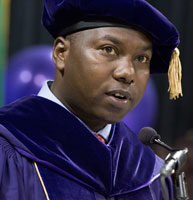Value of Fogarty-supported research training: Q and A with Dr Peter Cherutich
January / February 2016 | Volume 15, Issue 1
Peter Cherutich, M.B.Ch.B., Ph.D., M.P.H., is a deputy director of medical services in Kenya's Ministry of Health and heads its sexually transmitted disease control program. He has been active in HIV research for more than a decade.
After earning his medical degree and master's in epidemiology at the University of Nairobi, he pursued a master's in public health (MPH) from the University of Washington (UW), supported by Fogarty. With additional funding from Fogarty and others, he earned a doctoral degree from UW, which honored him with its 2015 award for academic excellence.

Photo by Tatoosh Media
Dr. Peter Cherutich
What does this award mean to you?
It means a lot to me and also to other scholars from overseas, to show that it's possible with a lot of diligence to excel. I do hope it will inspire other people. I became conscious of public health as a child. I lived in a village where it was very common to witness complications of a lot of infectious diseases and I lost my younger sister to pneumonia that wasn't treated in time - the local health clinic didn't have the capacity.
What role did Fogarty play in your career?
The enduring influence from Fogarty was through my MPH training and subsequent research, building my skills through research. It was transformative. The mentorship I got was very intense, from clarifying thought, to correction of typos and so on.
My focus was epidemiology with a minor in international health, and I took a lot of courses on epidemiological methods and biostatistics. The core training was very critical for me. I was beginning to launch my research career and this enabled me to conceptualize and design research proposals, to be able to do very robust analyses of my own data.
I learned the need for rigor, rigor, rigor. Research is not just like running a program. You need rigor and a lot of integrity. At the start of my MPH research, I wasn't very careful in terms of storing and cataloging my samples - and paid a high price. I didn't have the proper agreement with the lab where I was storing samples - they moved and didn't inform me and some samples were lost. Since then, I have become more particular with details and I learned to be sure to document things and have them properly done.
Another step you need to generate good science through research is by being clear about the way you ask questions and how you analyze the findings. The meanings can be very nuanced. Before my training, when I was a government scientist giving, say, interviews for newspapers, anything goes. But when describing research, you have to choose every letter - every sentence has a pregnant meaning, it has to be very carefully thought through. That discipline didn't come to me naturally, but I definitely like challenges.
How did you become interested in research?
In medical school, I was planning to become a cardiologist. HIV was not on my radar screen, even though we did a lot of HIV care. It was emotionally draining, because that was a time when antiretroviral therapy hadn't begun in Kenya, so there wasn't much to do except treat opportunistic infections, counsel people and just send them home.
One of my first jobs was at the Ministry of Health and I was sent to an AIDS conference in Africa. I saw people presenting their data with a lot of confidence and flair, and found the generation of knowledge through research very exciting. That was my defining moment for research.
In my own work, the results of my cross-sectional study on HIV risk created awareness that the adolescent population was really at high risk. It led to a youth program, a national HIV prevention program. Regarding other research I have participated in over time, supported by NIH or others, some has transformed HIV prevention policy in Kenya, such as promotion of circumcision to prevent HIV transmission.
What do you see in your future?
Being the first M.D./Ph.D. graduate in implementation science in my country, it's hard to have an impact on your own. What would be very appropriate for me to do is to build capacity for implementation science, within the Ministry of Health, the universities and implementing agencies in health, and also mentor people who are interested in implementation science. This will have a bigger impact than working alone. If we can build that capacity so that there's a critical mass of people suffused through the entire health sector, to me, that would be a very useful way of spending my time.
More Information
To view Adobe PDF files,
download current, free accessible plug-ins from Adobe's website.